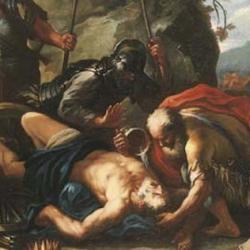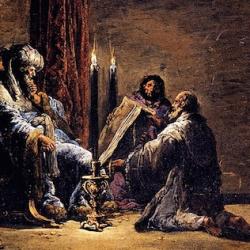The story of David’s installation of the ark in Jerusalem can be told as a series of “outbursts” (variations of the Hebrew word paratz; see Johnstone, 1 & 2 Chronicles, 169). In total, the verb paratz is used four times in chapters 13-15, and the noun “outburst” (peretz) five times, twice by itself (13:11; 14:11) and three times in place names.
The story begins with an outburst from David. He says to the assembly of commanders and princes, “Let us burst (paratz) out and send” (1 Chronicles 13:2). Johnstone suggests that the verb is used to highlight the impetuous nature of David’s plan. He doesn’t assemble Levites; he doesn’t consult the law of Moses; he just bursts out with a plan.
The plan is upset when Uzza reaches for the ark and Yahweh bursts out (paratz) against him (13:11), leading David to call the place “Outburst of Uzza” (Peretz-Uzza, 13:11).
David places the ark in the house of Obed-edom and goes off to fight Philistines. He wins a battle at Baal-peratzim, a battle summarized in 14:11, which uses the Hebrew word four time:
A. They came to Baal-peratzim.
B. Yahweh has burst out (paratz) against my enemies.
B’. Like the outburst (peretz) of waters.
A’. So they called the place Baal-peratzim.
David learns his lesson. If he wants the Lord to burst out against His enemies and not his servants, he needs to seek the Lord according to His ordinance (15:13).















